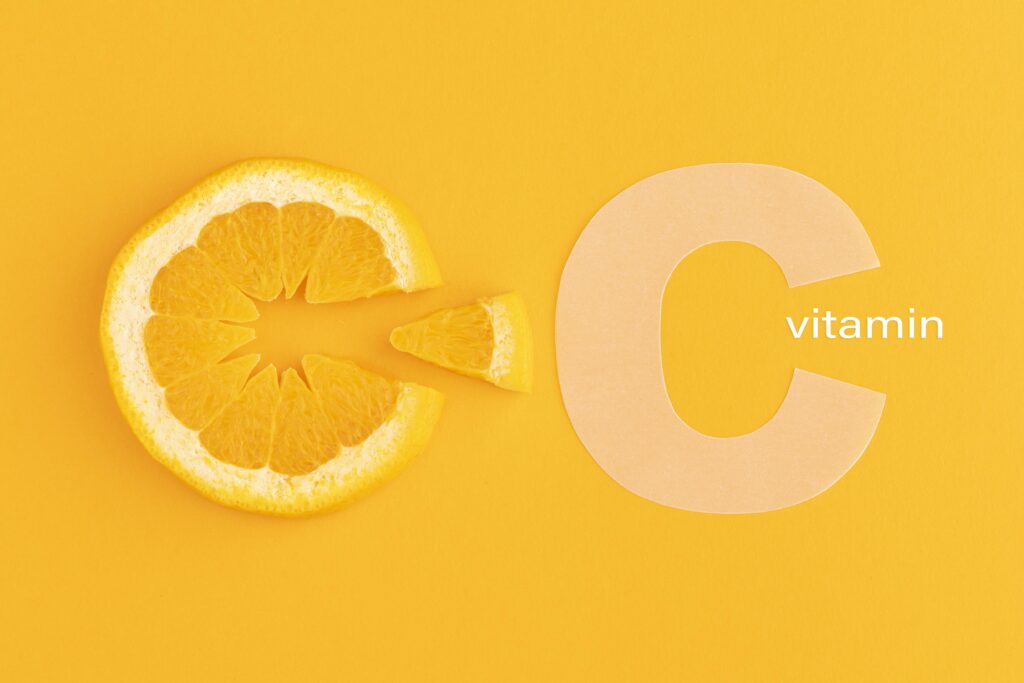Whether you’re battling a cold, trying to brighten your skin, or boosting overall wellness, Vitamin C (also known as ascorbic acid) has probably been your go-to remedy.This mighty vitamin is doing way more than most of us give it credit for. Let’s unpack everything it’s really capable of.
Welcome back to our vitamin series! After exploring the fat-soluble Vitamin A, we now begin our journey into water-soluble vitamins, starting with one of the most talked-about nutrients—Vitamin C.

Table of Contents
🧬 What Is Vitamin C?
Vitamin C is a water-soluble vitamin, meaning it dissolves in water and is not stored in large amounts in the body. That’s why it’s important to keep getting it regularly—either from the food you eat or through supplements.
It plays a crucial role in:
- Supporting the immune system
- Acting as a powerful antioxidant
- Aiding in collagen synthesis (essential for skin, bones, and connective tissue)
- Improving iron absorption
- Promoting faster wound healing

🛡️ Health Benefits of Vitamin C
1. Boosts Immunity Naturally
Vitamin C enhances the function of white blood cells, especially phagocytes and T-cells, helping your body fight off infections more efficiently. It also helps strengthen your skin’s barrier, which acts as your body’s very first shield against the outside world.
2. Powerful Antioxidant Protection
Vitamin C acts as a powerful antioxidant, fighting off harmful free radicals—those unstable molecules that can harm your cells and speed up aging or illness. It also helps lower your risk of long-term conditions like heart disease and cancer.
3. Essential for Skin and Wound Healing
Collagen is vital for skin elasticity and wound repair. Vitamin C is directly involved in collagen production, which is why it’s widely used in anti-aging skincare and healing supplements.
4. Improves Iron Absorption
Vitamin C converts iron from plant sources (non-heme iron) into a form that’s easier for your body to absorb—making it especially helpful for vegetarians and vegans.
5. Supports Brain Health
Vitamin C aids in neurotransmitter production, supports cognitive function, and may help reduce the risk of neurodegenerative diseases like Alzheimer’s.

🍊 Top Food Sources of Vitamin C
Unlike most animals, our bodies can’t make Vitamin C by themselves—so we have to rely on our diet to get it. The good news? It’s found in plenty of fruits and veggies.
Rich sources include:
- Citrus fruits: oranges, lemons, limes, grapefruit
- Guava (one of the highest sources!)
- Strawberries
- Papaya
- Kiwi
- Pineapple
- Mango
- Bell peppers (especially red)
- Broccoli
- Brussels sprouts
- Tomatoes
- Spinach
💡 Tip: Vitamin C is sensitive to heat and light—so eat raw or lightly cooked fruits and veggies when possible.

⚠️ Vitamin C Deficiency: Symptoms & Risks
Deficiency is rare but possible, especially in people with poor diets, smoking habits, or digestive disorders.
Symptoms of low Vitamin C include:
- Frequent infections
- Fatigue and weakness
- Slow wound healing
- Dry, rough skin
- Swollen or bleeding gums
- Easy bruising
- Joint pain
- Severe deficiency can lead to scurvy, a historical but still occasionally reported condition characterized by bleeding gums, tooth loss, and anemia.
💊 Should You Take a Supplement?
For most people with a balanced diet, Vitamin C supplements are not necessary. However, supplementation may be recommended in:
- Smokers (they have lower Vitamin C levels)
- People under physical stress (athletes, surgery, infections)
- Individuals with poor absorption (e.g., Crohn’s disease)
- People recovering from wounds or surgery
🧴 Recommended Daily Allowance (RDA):
- Adults: 75 mg/day (women), 90 mg/day (men)
- Smokers: Add +35 mg/day
- Safe upper limit: 2000 mg/day
🧪 Excess Vitamin C is usually excreted in urine, but high doses may cause stomach upset or kidney stones in sensitive individuals.
👶 Vitamin C for Kids
Kids need enough Vitamin C to grow well, heal their tissues, and keep their immune system strong. It’s best provided through fresh fruits like oranges, amla, or guava rather than processed juices.

🧴 Vitamin C in Skincare
Topical Vitamin C serums are popular for improving skin tone, reducing pigmentation, and boosting collagen. When used correctly, they can visibly enhance skin health and glow.
📝 Key Takeaways
- Vitamin C is vital for immunity, skin, iron absorption, and antioxidant defense.
- Best sources are fresh fruits and vegetables—especially citrus, guava, and bell peppers.
- Deficiency is rare but may occur in poor diets, smokers, or digestive disorders.
- Supplements help when dietary intake is inadequate or body demand is higher.
- Cooking destroys Vitamin C, so aim for fresh or lightly cooked options.
📘 Coming Up Next: Vitamin B Complex – The Energy Vitamins
Next in our water-soluble vitamin series, we’ll decode the Vitamin B Complex—a group of eight essential vitamins that fuel your metabolism, support brain function, and help your body create energy. Don’t miss it!
